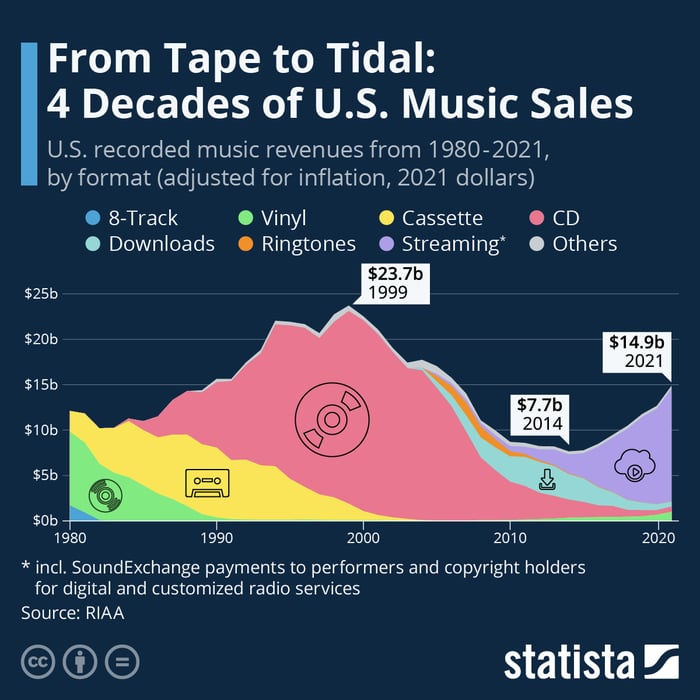Many investors likely own shares of Spotify Technology (SPOT 0.23%) because they're familiar with its service. Streaming is gaining real traction in the entertainment industry, so Spotify seems like a good bet. But with the stock price down 50% year to date, investors are probably wondering how resilient Spotify's business could be amid a slowing economy.
The term "recession" is popping up a lot lately. It is often associated with a period of weakness in gross domestic production (GDP). This has gotten more attention recently after the U.S. posted its second consecutive quarter of GDP decline. When the economy is weak, it hits certain sectors, including one that Spotify relies on -- advertising. Its ad-supported streaming plan is used by more than half of monthly active users.
But even with the economic headwinds, Spotify stock jumped following its Q2 earnings report in July. The music streamer posted solid growth in monthly active users and revenue. That suggests Spotify could be a more recession-resistant business than market participants realize.
Why the market loved Spotify's quarter
Management reported not seeing any material impact from the economy, but it did recently take preemptive steps to reduce hiring just in case market conditions worsen. CEO Daniel Ek mentioned it has noticed several markets performing better than internal forecasts.
Spotify had reported decelerating growth in monthly active users throughout 2021, which was a key factor that seemed to weigh on the stock's performance. But that streak has come to an end. In the first and second quarter, Spotify has now reported stable growth in monthly active users, up 19% through the first half of the year.
Still, Spotify's outlook points to another downtick in user growth. Third-quarter monthly active users are expected to reach 450 million, up 18% over the year-ago period. But that's hardly concerning.
It seems investors were just happy to see a subscription service post double-digit gains in users and revenue, especially after the recent struggles of streaming pioneer Netflix, which has struggled to grow its subscriber base over the last two quarters.
Indeed, Spotify's revenue increase of 23% over the year-ago quarter looks pretty darn good next to the leading video streamer's 9% growth.
Spotify's results shouldn't be surprising given the enormous tailwind at its back. After a roughly 15-year drought, growth of U.S. recorded music revenue is rapidly rising thanks to streaming.

So far, Spotify seems to be a service that users can't live without -- even in a potential recession. Spotify reported that its subscriber churn levels, or the rate of cancellations, were in line with expectations in the second quarter, and most importantly, down year over year.
Risks to watch for with Spotify
While monthly active user growth remains stable, there are a few potential obstacles to watch.
First, management attributed the 14% increase in premium subscribers to an extra week of promotions in the quarter. This could present a problem later if the economy continues to worsen and consumers who joined Spotify through a promotional offer are not willing to pay for a subscription.
The 2022 Digital Consumer Sentiment Survey revealed why some subscription services are struggling to grow this year. The survey found that 43% of respondents out of a sample of 1,054 U.S. adults chose to cancel an online subscription this year because it was too costly. This compares to 20% that cited the desire to consolidate services and 18% that canceled after a promotional pricing offer came to an end.
Another risk to watch is the digital ad spending market. Social media companies have experienced tremendous downward pressure on revenue this year as advertisers hold back on spending in an uncertain economic environment. Ad-supported users make up 59% of Spotify's total monthly active users.
However, ad-supported revenue was only 12.6% of total revenue last quarter, so it's not a huge part of Spotify's business. Moreover, the company reported a 31% year-over-year increase in advertising revenue, and management expects another solid quarter of growth in Q3.
While no business may be completely recession-proof, Spotify is in a stronger position relative to most other streaming services and remains a good long-term investment.





